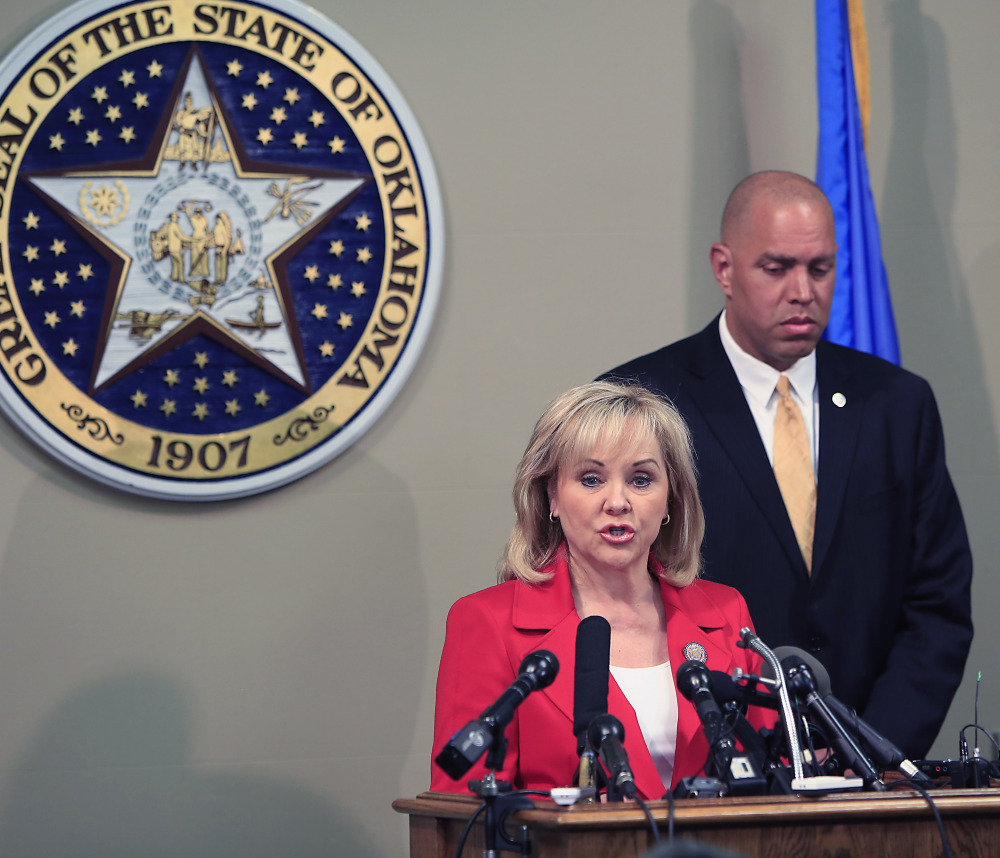DALLAS — A bungled execution in Oklahoma in which the condemned prisoner writhed and moaned as he received a lethal injection outraged death-penalty opponents, invited court challenges and attracted worldwide attention.
But the inmate’s agony alone is highly unlikely to change minds about capital punishment in the nation’s most active death-penalty states, where lawmakers say there is little political will to move against lethal injections – and a single execution gone wrong won’t change that.
Oklahoma Rep. Mike Christian, a Republican lawmaker who pushed to have state Supreme Court justices impeached for briefly halting Tuesday’s execution, was unsparing.
“I realize this may sound harsh,” Christian said, “but as a father and former lawman, I really don’t care if it’s by lethal injection, by the electric chair, firing squad, hanging, the guillotine or being fed to the lions.”
Attorneys for death-row inmates hope Tuesday’s spectacle provides new evidence to argue that the injections are inhumane and illegal. But beyond the courtroom, support for capital punishment is undeterred in the states that perform the greatest number of executions – Texas, Oklahoma, Florida, Missouri, Alabama, Georgia and Ohio. And nowhere in those places are any elected officials of either political party talking seriously about using the incident to seek an end to executions.
Missouri Rep. Paul Fitzwater, a Republican who chairs the state House’s corrections committee, called the botched execution “horrible” and “definitely not humane” but said it had not sparked any calls for reform.
Oklahoma prison officials say Tuesday’s execution of Clayton Lockett went awry when an intravenous line of deadly drugs became dislodged. He later died from an apparent heart attack. Lockett had been condemned for shooting a 19-year-old girl with a sawed-off shotgun and watching as two accomplices buried her alive.
Oklahoma Gov. Mary Fallin has stayed an upcoming execution as prison officials investigate, but she too reaffirmed her support for capital punishment.
On Friday, President Obama said the Oklahoma event highlighted problems with the death penalty and he’s asking his attorney general for a review.
National surveys by Gallup indicate that support for the death penalty remains strong, though it has declined over the last 20 years, from 80 percent in favor of capital punishment in 1992 to 60 percent two years ago.
There are signs of a shift, primarily in the West and Northeast, after almost four decades in which no state legislatures voted to end executions.
Five states – New Jersey, New Mexico, Illinois, Connecticut and Maryland – have formally abolished the death penalty in the last seven years, according to the Death Penalty Information Center, which opposes capital punishment. New York’s death penalty was abolished by a court, and several other states have placed executions on hold. An anti-death penalty bill in New Hampshire fell one vote short of passage.
Lawmakers in those states most often cited factors besides problems with lethal injection. Several governors cited the risk that an innocent person could be executed or the skyrocketing costs of fighting appeals in death-row cases.
“The main factor was the miscarriage of justice,” former New Mexico Gov. Bill Richardson said Friday in an interview. “I was aware of the serious problems with lethal injections, but it was not at the top.”
Richardson signed his state’s abolition bill in 2009 and has since campaigned against the death penalty in other states. He described meeting with several exonerated death row inmates – there are more than 140 nationwide – as well as families of victims and law enforcement officials. He predicted that the botched execution would weigh on other governors considering the death penalty.
Send questions/comments to the editors.



Success. Please wait for the page to reload. If the page does not reload within 5 seconds, please refresh the page.
Enter your email and password to access comments.
Hi, to comment on stories you must . This profile is in addition to your subscription and website login.
Already have a commenting profile? .
Invalid username/password.
Please check your email to confirm and complete your registration.
Only subscribers are eligible to post comments. Please subscribe or login first for digital access. Here’s why.
Use the form below to reset your password. When you've submitted your account email, we will send an email with a reset code.